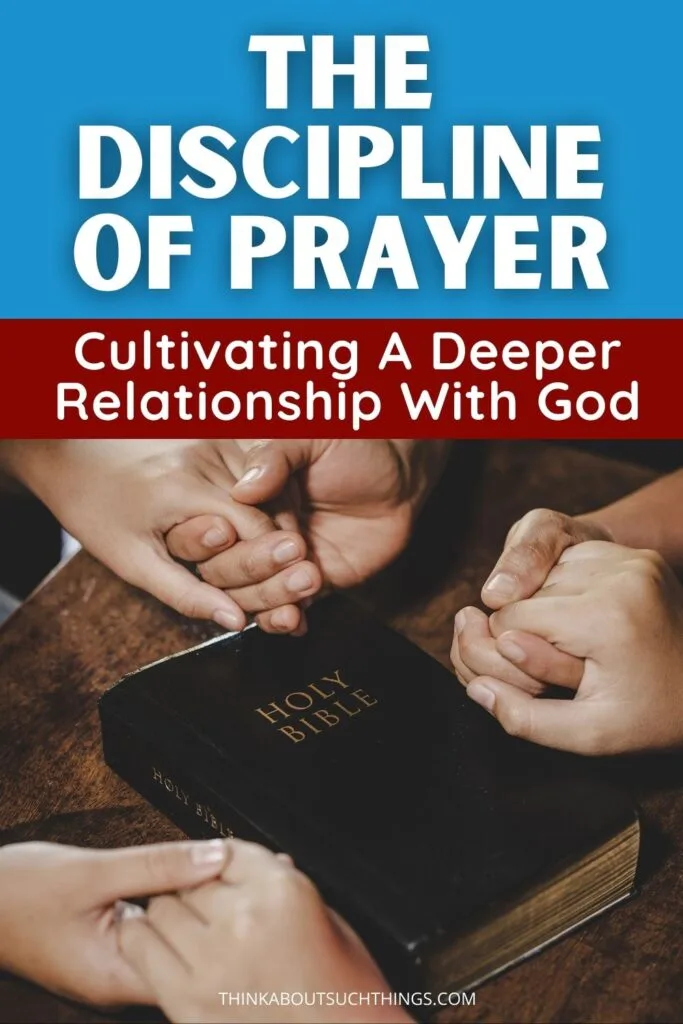In this article, we will be diving into the discipline of prayer and how, as Christians, we can cultivate prayer to help us grow in our walk with the Lord. So, grab your Bible, and let’s learn…
Our number one priority as believers should always be our relationship with God.
That’s what makes us different from other people, groups, religions, or faiths: our beliefs are not about religious actions, traditions, or philosophies but about the fact that we are in a living relationship with the Almighty Creator of everything!
Yet many of us struggle to understand how to cultivate this relationship to make it deeper, but the answer is simple: prayer.
This might sound a bit cliché, but understanding how prayer works will open an entirely new dimension in our relationship with God. It’s really that simple.
Sadly, a lot of spiritual things are simplistic, but we tend to make them complicated.
So, let’s look at what the Bible says about the discipline of prayer.

What Is Prayer?
As we all know, prayer is communicating with God.
But that is an oversimplification. There are many kinds of prayers, and we need a good balance of these types before we can really say we are in a healthy relationship with God. I’ve gone over in more detail the 9 types of prayer in a previous post but here are some basics:
Some of the types of prayer mentioned in the Bible are (in no particular order):
- Prayers of thanksgiving
An excellent example is Psalm 100:4. It means thanking God for what He’s done for us, whether it’s an answer to one of our prayers or just being thankful in principle. It’s easy to thank God when good things happen, but it’s just as easy to forget to do so. But the real challenge is thanking God when we don’t see the good things He’s done.
In these cases, a prayer of thankfulness could be the perfect way to stir our faith and show God that we are still thankful, even when things around us look bleak.
- Prayers of faith
These are the prayers we pray when we are expressing faith for something specific. James 5:13-16 says, “Is anyone among you suffering? Let him pray. Is anyone cheerful? Let him sing praise. Is anyone among you sick? Let him call for the elders of the church, and let them pray over him, anointing him with oil in the name of the Lord.
And the prayer of faith will save the one who is sick, and the Lord will raise him up. And if he has committed sins, he will be forgiven.”
- Prayers of intercession
Daniel interceded for his people in Daniel 9:1-27. We are called to pray for our leaders, other believers, our governments, friends, family, and even our enemies. Whenever you pray actively on someone else’s behalf, you pray a prayer of intercession. - Prayers of consecration
These are prayers where you dedicate something to the Lord or declare it holy, like praying before meals or praying for a blessing over someone. There aren’t many examples of this in the Bible, but one example is Matthew 26:26-27. “While they were eating, Jesus took bread, and when he had given thanks, he broke it and gave it to his disciples, saying, “Take and eat; this is my body.” Then he took a cup, and when he had given thanks, he gave it to them, saying, “Drink from it, all of you. - Prayer of the Holy Spirit
Sometimes we don’t know what to pray, but look at what the Bible says in Romans 8:26-27:
“Likewise the Spirit helps us in our weakness. For we do not know what to pray for as we ought, but the Spirit himself intercedes for us with groanings too deep for words. And He who searches hearts knows what is the mind of the Spirit, because the Spirit intercedes for the saints according to the will of God.”
- Prayers of worship
The book of Psalms is full of examples, but we can also look at Revelation 4:11 and Hebrews 13:15.
To many modern believers, the concept of worship is synonymous with slower, passionate songs we sing in church services, and the result is that some may struggle to worship without it.
But, it’s crucial to be able to worship God in prayer without music or guidance, and it’s a skill to learn and cultivate, as it’s one component that’s often missing from our prayer lives. It’s also good to point out that worship is very different than praise. Songs and singing is praise.
How Prayer Cultivates Our Relationship With God

We can compare our relationship with God with any of our human relationships. God does this, too, by referring to Himself as our Father and comparing the relationship between Jesus and the church to that of a husband and wife.
And, just like our human relationships, communication is the key to a healthy relationship with God.
One sure way to ruin a friendship is to never communicate. An equally (or even more) efficient way is to only talk to that person when you need something from them.
Most of us have had those friendships that dwindle away because there’s no communication, or it turns out it’s entirely one-sided.
Many marriages have become stale and dull because the husband and wife no longer talk to each other except when they have to.
A healthy marriage should involve different types of communication and a willingness to make time simply to talk to your spouse, even when you don’t necessarily have something specific to talk about.
God wants to communicate with us, and He does that in various ways. But He is also waiting for us to communicate with Him, and the more we draw near to Him, the more He will draw near to us.
Come near to God and he will come near to you. Wash your hands, you sinners, and purify your hearts, you double-minded. – James 4:8
However, this requires a balance of all the different types of prayers. God wants us to take our cares and concerns to Him, so we need to include prayers of faith, consecration, and intercession.
But the relationship also requires adoration, which is where prayers of praise and worship come in.
If a husband never tells his wife how much he adores her (and the other way around, too), the relationship won’t grow.
The same is true of our relationship with God. He is always ready to shower us with His adoration, but we must be willing to do the same.
The other important part is to do this consistently, not just when you feel like it or happen to remember. That’s often the most challenging part, and it requires discipline.
Cultivating The Discipline Of Prayer
A discipline is similar to a habit but usually involves more of a purposeful effort. You’re not simply doing something because it is a habit (though it will eventually become one); you’re putting in the effort to do it.

So, how can we make prayer a discipline?
- Pray constantly
1 Thessalonians 5:17 says, “Pray without ceasing.” This could seem like a tall order. However, when you’re with someone you love, you will be communicating consistently. Yes, there may be comfortable silences from time to time, but you will be discussing various things with them throughout your time together.
Well, God is always with you, so start talking to Him throughout the day. These can be casual discussions, like the ones you would have if there were a friend with you.
It will take a while to get used to this, and it might feel awkward at first, but the more you do it, the stronger your relationship with God will grow.
- Schedule a time to pray
Daniel 6 tells us how Daniel had a regular prayer time that was so predictable that people used it to conspire against him. The same is true of David (Psalm 55:16-17).
It’s good practice to schedule a fixed prayer time. Choose a time when you are unlikely to be interrupted, then set the alarm for that.
Tell your family that this is your prayer time and that you will not be disturbed. Some people find that it helps to schedule this time for late at night after the kids have gone to bed or early in the morning before everyone wakes up.
The next important part is to stick with it. Have someone hold you accountable if you must, but do what you must to keep up with your prayer schedule.
- Be kind to yourself
Don’t set unrealistic expectations. As a young believer, I heard about a church leader who ministered powerfully and said his quiet time lasted 5 hours daily. I tried to emulate him, which worked for about two days before I couldn’t keep up with the schedule anymore.
God appreciates the time you spend with Him. It’s about the quality of the time and how consistently you do it, not how long you can keep going.
Smith Wigglesworth once said, “I don’t ever pray any longer than 20 minutes. But I never go 20 minutes without praying.”
Don’t measure your prayer time in how long it continues because God doesn’t. Do what you feel you can commit to, then commit to it.
- Include various kinds of prayers in your prayer time, but don’t make a recipe for it. A relationship that feels forced is no longer a relationship.
Having a basic guideline, like setting out times for praise, worship, intercession, etc., will help you to have a balanced prayer life, as long as you’re not too religious about it.
Sometimes you may find that you will spend your entire prayer time just worshiping. That’s okay. It’s still actively building your relationship with God, and since you will be praying throughout the day anyway, there’s still plenty of time to include the rest.
If we want to cultivate our relationship with God, we must also develop the discipline of prayer. That includes all the different kinds of prayers, as they are all important.
However, we must never forget that no relationship should ever feel forced. But at the same time, a healthy marriage is based on making quality time for your spouse even when you are too tired and would instead just go to sleep.
Similarly, a healthy relationship with God requires that we make time to talk with Him, even when we desperately want to do something else.

Melissa is a passionate minister, speaker and an ongoing learner of the Bible. She has been involved in church and vocational ministry for over 18 years. And is the founder of Think About Such Things. She has the heart to equip the saints by helping them get into the Word of God and fall more in love with Jesus. She also enjoys family, cooking, and reading.
She has spoken in churches in California, Oregon, Texas, and Mexico and has been featured in Guidepost Magazine and All Recipes Magazine. Read More…
